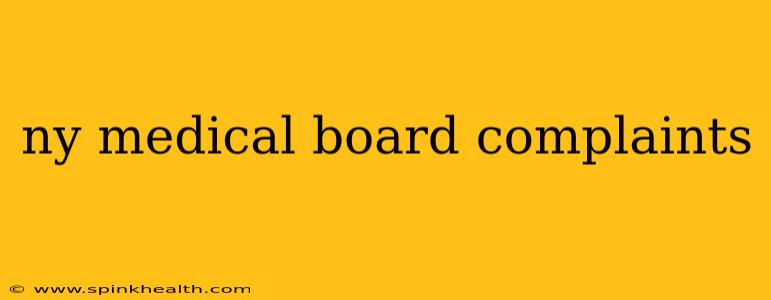The hushed whispers, the anxious glances – a medical board complaint casts a long shadow. In New York, a state with a robust healthcare system and high standards, navigating this process can feel like venturing into a labyrinth. But understanding the process, the potential outcomes, and your rights can illuminate the path. This isn't just about legal jargon; it's about protecting reputations, ensuring patient safety, and upholding the integrity of the medical profession.
My journey into this complex world started with a personal experience – a close friend faced a complaint, leaving us scrambling for information amidst a flurry of official documents and confusing terminology. What followed was a deep dive into New York's medical licensing regulations, countless hours of research, and countless conversations with legal professionals. Through this experience, I gained a profound understanding of the system's intricacies and the crucial need for clear, accessible information. This article, therefore, is not just an informational piece; it's a guide born from real-world challenges and a commitment to empowering those facing similar situations.
What Constitutes a Complaint Against a New York Physician?
The New York State Office of Professional Medical Conduct (OPMC) handles complaints against licensed physicians. These complaints can range from seemingly minor infractions to serious allegations of malpractice or misconduct. The OPMC carefully reviews each complaint to determine if it warrants a formal investigation. A complaint might stem from:
- Medical malpractice: A claim of negligence resulting in patient harm.
- Improper billing practices: Issues related to fraudulent or deceptive billing.
- Substance abuse: Evidence of impairment affecting professional conduct.
- Sexual misconduct: Any inappropriate sexual contact with a patient.
- Boundary violations: Actions blurring the professional relationship with patients.
- Incompetence: Demonstrated lack of skill or knowledge affecting patient care.
How are Medical Board Complaints in NY Investigated?
The process begins with a thorough review of the complaint by the OPMC. If the complaint is deemed credible, a formal investigation will commence, which might include:
- Review of medical records: Examining patient charts to verify the details of the alleged incident.
- Interviews with witnesses: Gathering statements from patients, staff, and other relevant individuals.
- Expert consultations: Seeking opinions from medical specialists regarding the appropriateness of care provided.
- Site visits: In some cases, inspectors may visit the physician's practice or hospital to assess the environment.
This investigative phase can be lengthy, often stretching over several months or even years. The physician under investigation has the right to legal representation and can participate in the process.
What Happens After an Investigation?
Once the investigation is complete, the OPMC will issue a determination. Possible outcomes include:
- Dismissal of the complaint: If the investigation finds insufficient evidence of wrongdoing.
- Letter of Reprimand: A formal letter of warning outlining the concerns and expectations for future conduct.
- Settlement Agreement: A negotiated agreement between the physician and the OPMC outlining specific actions the physician must take.
- Disciplinary action: This could include fines, suspension of license, or revocation of license, depending on the severity of the offense.
Can I File an Anonymous Complaint?
While anonymity is not guaranteed, the OPMC understands the concerns individuals may have about retaliation. They will work to protect the identity of complainants as much as possible, although this is not always feasible during the investigation.
What are the Common Outcomes of Medical Board Complaints in NY?
The outcome of a medical board complaint is highly variable and depends on the specifics of the case. Some complaints are dismissed, while others result in disciplinary actions ranging from a simple reprimand to license revocation. The OPMC aims for proportionate penalties based on the severity of the infraction and the potential risk to patient safety.
How Long Does a Medical Board Complaint Take to Resolve?
The length of the process varies dramatically, depending on the complexity of the complaint and the availability of resources. Some complaints are resolved relatively quickly, while others can take years to reach a final resolution.
This journey through the intricacies of New York's medical board complaint system highlights the need for transparency, fairness, and due process. It's a system designed to protect patients, yet it also safeguards the rights of licensed physicians. By understanding the process, individuals can navigate this challenging landscape with more confidence and clarity. Remember, seeking legal counsel is often advisable when facing a medical board complaint.

